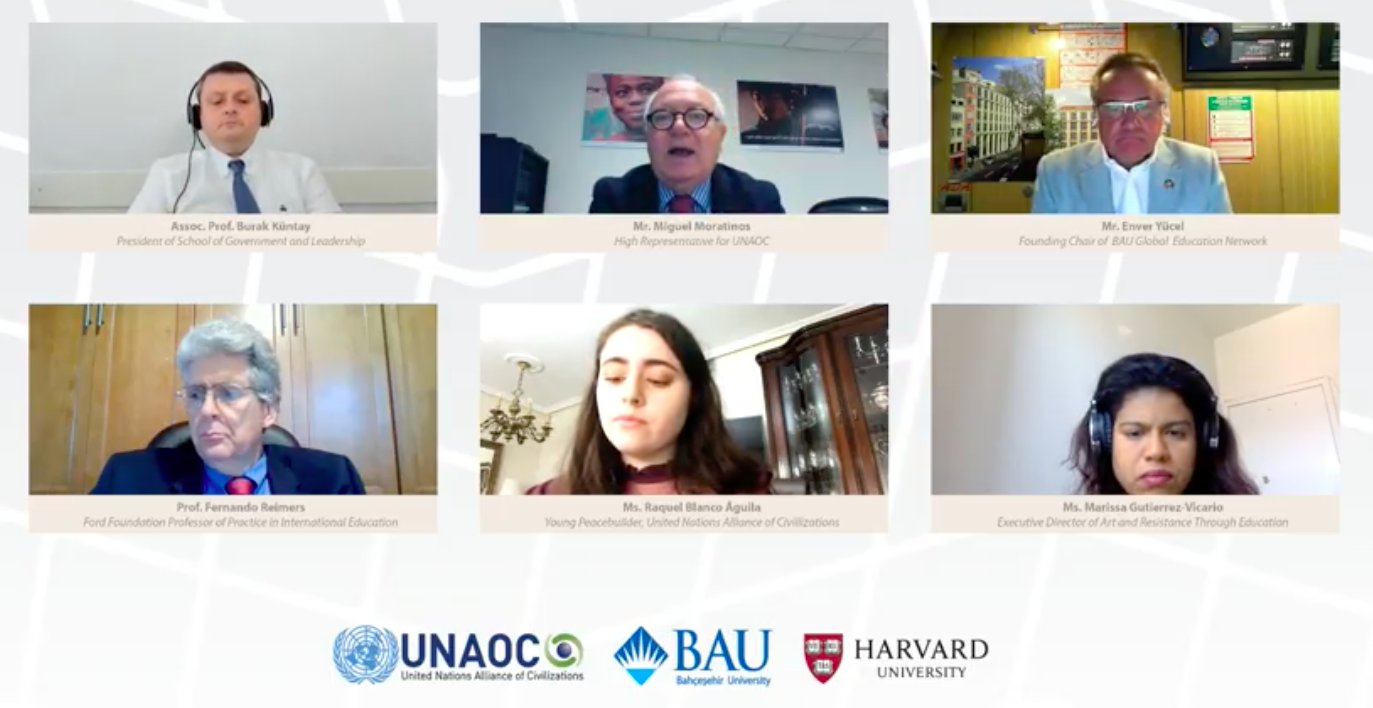Introduction by
Mr. Miguel Moratinos, High Representative for UNAOC
At the virtual discussion entitled
“The Importance of Education for Global Citizenship in the age of COVID-19”
Organized by BAU Global Education Network
Good afternoon in New York
Good evening if you are joining from overseas,
I am very pleased to be speaking about this important topic. The importance of education in global citizenship. I believe we touched on that topic during the interactive discussion that I had with the students and professors of BAU in my visit last year to your Istanbul campus.
Amid this pandemic, Global Citizenship Education is even more relevant than ever before as we saw this surge in stigma, polarization, racism and hate speech against vulnerable communities. While traditional education, focused on improving literacy and facilitating the transmission of knowledge and skills from one generation to the next, remain vital, there is a growing need for transformative education such as Global Citizenship Education (GCED), which nurtures shared values and respect for diversity. Traditional education and transformative education complement each other.
The COVID-19 pandemic has brought unprecedented educational disruption with 1.2 billion students and youth across the planet affected by school closures. This figure amounts to almost 60% of the world’s student population.
Now that the situation is improving in many countries, governments around the world are preparing to re-open for business including opening schools. Planning ahead is essential to ensure a smooth transition for students, teachers and families, taking into account the impact of prolonged closures on learning.
During the COVID19 pandemic, there are many lessons that we have either learned or we came to re-emphasize their importance.
Related to education for example:
- We have learned how empathy, compassion, respecting diversity and being able to recognize and challenge discrimination are key skills that young people need to acquire. These skills can only be learned at home or at school especially at early age. These traits are universal and global values that constitute an essential component for a globaal citizenship education. It protect societies becoming more polarized. Recent research shows that socio-emotional skills contribute to building the resilience of young people, especially in times of crisis. I am very pleased that our joint collaboration with UNESCO, the UN Counter Terrorism and the Mahatma Ghandi Institute are launching a project Intercultural dialogue and socio-emotional competencies for peacebuilding” it is a Videogames project training young people to use video games in peace building.
- Another essential element is Digital technologies which have become a positive enabler in this crisis for millions of children and young people to connect with their teachers in schools and universities so as to avoid a gap in education. However, inequality of access to broadband connectivity and inaccessibility of ICTs hinders effective remote participation and access to remote schooling arrangements, health information and telemedicine by all. According to ITU, an estimated 3.6 billion people remain offline, with the majority of the unconnected living in the least developed countries.
- The response to the virus is also having a differentiated impact on segments of the population impacting children. The fact that women make up 70 per cent of the global health workforce puts them at greater risk of infection. This factor is also relevant to education. As women remain the primary member of the household attending to the family daily needs including helping children with their education. Being in the frontline as health responders and care givers, there is a lot of pressure on women to walk this thin line between their jobs and home while keeping themselves healthy and safe.
- Additionally, accompanying the crisis has been a spike in domestic violence reporting, at exactly the time that services, including rule of law, health and shelters, are being diverted to address the pandemic. With families isolated in their homes, children are also facing the rapid increase of online child abuse.
- In the socio-economic report of the UN Secretary General in which he outlined the impact of the pandemic and recommendations for the global response and recovery plans, he highlighted the following actions in so as to preserve Quality Education for Children and Youth;
- Distance education through: (i) access to loans or equipment transfers for students and/ or households; provision of internet connection; and (iii) public-private partnerships to make platforms and tools for distance learning available free of charge.
- Public and private efforts to guarantee and expand the capacity of the networks and prevent demand surges. Governments and operators must have network demand analysis and contingency plans.
- Digital learning resources for teachers and parents: online multilingual free educational applications to facilitate learning, provide social care and interaction during periods of school closure.
- Publicize country efforts to maintain the provision of inclusive education in different contexts.
- If schools are open: ensure that social distancing measures, hygiene and food safety and quality standards are followed.
- If schools are closed, providing take-home rations in lieu of the meals, home delivery of food and provision of cash or vouchers.
I would like to stop here and leave the other points during the interactive discussion.

